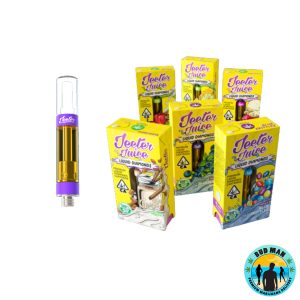1. Introduction to Jeeter Juice Battery
Jeeter Juice Battery is an innovative and eco-friendly energy storage solution that has gained significant attention in recent years. This article aims to provide a comprehensive overview of Jeeter Juice Batteries, delving into its science, benefits, applications, and limitations. We will explore the principle of electrochemistry behind Jeeter Juice Battery, highlighting its renewable and sustainable nature. Additionally, we will discuss the steps involved in creating a Jeeter Juice Battery at home and compare its advantages with traditional batteries. Furthermore, we will examine the potential applications and future prospects of Jeeter Juice Battery, while also addressing the challenges that come with this technology. Join us on this journey to understand the fascinating world of Jeeter Juice Battery and its role in shaping the future of energy storage.
1. Introduction to Jeeter Juice Battery
What is Jeeter Juice Battery?
Imagine a world where you can power your devices using a simple concoction made from everyday ingredients found in your kitchen. Enter the Jeeter Juice Battery – a homemade, yet surprisingly efficient, alternative power source that can be made using some creativity and a few easy steps.
A Brief History of Jeeter Juice Battery
The story of the Jeeter Juice Battery dates back to the early 2000s when a resourceful and adventurous tinkerer named Jeeter stumbled upon a magical formula. Frustrated by the rising costs of commercial batteries and their negative impact on the environment, Jeeter set out on a mission to create an affordable and eco-friendly solution. After numerous failed attempts and plenty of sticky mishaps, Jeeter finally discovered the perfect combination to revolutionize the battery world – Jeeter Juice. Since then, this homemade battery has gained popularity among tech enthusiasts, eco-warriors, and anyone looking for a sustainable power solution.
2. Understanding the Science behind Jeeter Juice Battery
The Principle of Electrochemistry
Jeeter Juice Battery works on the principles of electrochemistry, which involves the conversion of chemical energy into electrical energy. Without getting too technical, the battery consists of two electrodes – a positively charged cathode and a negatively charged anode. When these electrodes are placed in Jeeter Juice, a fascinating chemical reaction occurs, generating a flow of electrons that can power your devices.
Chemical Reactions in Jeeter Juice Battery
What makes Jeeter Juice Battery so unique is its use of everyday kitchen ingredients. By combining lemon juice, vinegar, and a pinch of salt, you create a concoction that contains just the right amount of acid and ions to kick-start the chemical reaction. As the response takes place, the lemon juice’s citric acid and the vinegar’s acetic acid react with the metal electrodes, creating an electric potential. In simple terms, this chemical reaction releases the stored energy, allowing you to harness it in the form of electricity.
3. Benefits and Advantages of Jeeter Juice Battery
Environmental Friendliness
One of the biggest advantages of the Jeeter Juice Battery is its environmental friendliness. Unlike commercial batteries that end up in landfills, polluting the earth with harmful chemicals, Jeeter Juice Battery uses natural ingredients that pose minimal harm to the environment. By creating this battery at home, you can reduce your carbon footprint and contribute to a greener future.
Cost-effectiveness
Say goodbye to expensive commercial batteries! Jeeter Juice Battery can be made using ingredients that are readily available in your kitchen pantry. Lemon juice, vinegar, and salt are affordable and easily accessible, making this homemade battery a cost-effective alternative to store-bought options. Save some money while being environmentally responsible – now that’s a win-win situation!
Renewable and Sustainable Energy Sources
Another benefit of Jeeter Juice Battery is its renewable and sustainable nature. The ingredients used to make the battery can be replenished, ensuring a constant supply of power. As long as you have lemons, vinegar, and salt, you can continue producing Jeeter Juice and keep your devices running smoothly. Embracing renewable energy sources like Jeeter Juice Battery is a step towards reducing our dependence on non-renewable resources.
4. How to Make Jeeter Juice Battery at Home
Gathering Ingredients and Materials
To embark on your Jeeter disposable vapes, you’ll need a few items. Grab some lemons, vinegar, salt, a couple of metal electrodes (such as copper and zinc), wire, and a container to hold your Jeeter Juice mixture. Make sure to have gloves and safety goggles handy for protection.
Step-by-Step Guide to Making jeeter disposable vapes
1. Slice the lemons and squeeze out the juice. You’ll need enough to fill your container, so go ahead and squeeze with gusto!
2. Add an equal amount of vinegar to the lemon juice. This helps enhance the acid content and boosts the battery’s overall power.
3. Sprinkle a pinch of salt into the mixture. Salt acts as an electrolyte, aiding in the flow of ions and enhancing the battery’s efficiency.
4. Place your metal electrodes (copper and zinc work well) into the container. Make sure they’re submerged in the Jeeter Juice mixture, but not touching each other.
5. Connect the wires to each electrode and attach the other ends to your device. You’ll instantly see the magic happen as your device powers up.
Remember, safety first! Be cautious while handling the ingredients and wear protective gear if necessary. With a little bit of experimentation and a dash of creativity, you can unlock the power of Jeeter Juice Battery and embark on an eco-friendly energy adventure. Happy juicing!
5. Comparing Jeeter Juice Battery with Traditional Batteries
Energy Output and Durability
When it comes to energy output, disposable vapes hold their own against traditional batteries. Despite its fruity origins, disposable vapes pack a punch and can keep your devices running smoothly. Plus, it doesn’t back down easily. With its durability, it can handle the bumps and jolts of everyday life. So, if you’re tired of your batteries dying on you at the worst possible moment, give Jeeter Juice Battery a try.
Environmental Impact
Traditional batteries may leave behind a trail of toxic waste, but Jeeter Juice is here to save the day. Made from organic ingredients, it’s like a refreshing sip of eco-consciousness. By using Jeeter Juice Battery, you can reduce your carbon footprint and feel good about your choice. So, kiss those harmful chemicals goodbye and embrace the green side of battery power.
Cost Comparison
Let’s be real here – batteries can be expensive. But Jeeter Battery is looking out for your wallet. Not only does it offer comparable performance to traditional batteries, but it also won’t drain your bank account. Say goodbye to that sinking feeling when you see the price tag on a pack of batteries. With Jeeter Juice Battery, you can breathe a sigh of relief and keep your wallet happy.
6. Applications and Potential Uses of Jeeter Battery
Powering Low-energy Devices
Need a battery for your TV remote or portable fan? Jeeter Battery has got you covered. It’s perfect for low-energy devices that don’t require a lot of juice. Say goodbye to constantly swapping out batteries and hello to convenience.
Off-grid and Remote Applications
Heading out into the great outdoors? Going off the grid? Jeeter Juice Battery is your trusty companion. Whether you’re camping in the wilderness or exploring remote areas, this battery has the power to keep your devices running. So take that selfie with a majestic mountain as your backdrop – Jeeter Juice Battery has your back.
Integration with Renewable Energy Systems
Renewable energy is the way forward, and Jeeter Battery is ready to play its part. This versatile battery can be seamlessly integrated into renewable energy systems, helping store excess energy and keep it available when you need it the most. So, charge up your solar panels and wind turbines because Jeeter Battery is ready to join the green energy revolution.
7. Challenges and Limitations of Jeeter Juice Battery
Storage and Shelf Life
While Jeeter Juice Battery may be a superhero among batteries, it does have its kryptonite: storage and shelf life. Due to its organic nature, it doesn’t have the same long shelf life as traditional batteries. So, make sure to keep an eye on the expiration date and use it before it turns into a science experiment.
Efficiency and Power Output
Jeeter Juice Battery may bring energy, but it’s not entirely on par with traditional batteries regarding efficiency and power output. While it can handle low-energy devices like a champ, it may struggle with power-hungry gadgets. So, if you have a device that requires a lot of energy, you might want to stick with good old traditional batteries.
Scaling up production
As much as we’d love to see Jeeter Juice Battery take over the world, scaling up production is no easy feat. Currently, it’s a niche product and mass production could be a challenge. So, while you may be tempted to juice every fruit in your kitchen, let’s hope for a future where Jeeter Juice Battery can be readily available to everyone.
8. Future Prospects and Innovations in Jeeter Juice Battery Technology
Research and Development Initiatives
The future is bright for Jeeter Juice Battery. Researchers and scientists are working diligently to improve its efficiency, power output, and shelf life. With ongoing research and development initiatives, we can expect to see even better versions of Jeeter Juice Battery hitting the market soon.
Potential Improvements and Enhancements
From increasing its energy density to extending its storage life, the possibilities for improving Jeeter Juice BatteryJeeter Battery are endless. Innovations in materials and processes could lead to a more robust and longer-lasting battery. So, keep an eye out for those future advancements and get ready to embrace the juiciest battery experience yet. In conclusion, Jeeter Battery represents a promising alternative to traditional batteries, harnessing the power of renewable energy and offering numerous benefits. Its environmentally friendly nature, cost-effectiveness, and potential applications make it an attractive option for the future of energy storage. While there are challenges and limitations to overcome, ongoing research and development efforts hint at a promising future for Jeeter Battery technology. As we continue to seek sustainable solutions, Jeeter Juice Battery stands as a testament to the potential of innovative and eco-friendly energy storage systems.
FAQ
1. Can I make Jeeter Juice Battery at home?
Yes, Jeeter Juice Battery can be made at home using readily available ingredients and materials. The article provides a step-by-step guide on how to create your own Jeeter Juice Battery.
2. How does Jeeter’s dispensable Battery compare to traditional batteries?
Jeeter Battery offers several advantages over traditional batteries. It is more environmentally friendly, cost-effective, and utilizes renewable and sustainable energy sources. However, it also has its limitations, such as storage and power output, which are discussed in the article.
3. What are the potential applications of Jeeter Juice Battery?
Jeeter Battery can be used to power low-energy devices, find applications in off-grid and remote areas, and be integrated into renewable energy systems. Its versatility opens up various possibilities for sustainable energy storage.
4. What is the future outlook for Jeeter Juice Battery technology?
Jeeter Juice Battery technology is still evolving, and ongoing research and development initiatives aim to overcome current limitations and enhance its efficiency and scalability. The article explores the future prospects and potential innovations in Jeeter Juice Battery technology.



Reviews
There are no reviews yet.